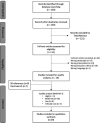Efficacy and safety of intra-articular therapies in rheumatic and musculoskeletal diseases: an overview of systematic reviews
- PMID: 34103406
- PMCID: PMC8186751
- DOI: 10.1136/rmdopen-2021-001658
Efficacy and safety of intra-articular therapies in rheumatic and musculoskeletal diseases: an overview of systematic reviews
Abstract
Objective: To summarise the evidence on intra-articular therapies (IAT) to inform the 2020 EULAR recommendations.
Methods: An overview of systematic reviews (SR) including randomised-controlled trials (RCTs) of IAT in adults with arthropathies was performed up to July 2020. Pain, function, and frequency of adverse events were the main efficacy and safety outcomes, respectively. Quality was assessed with the A MeaSurement Tool to Assess Systematic Reviews (AMSTAR)-2 tool.
Results: Of 184 references identified, 16 met the inclusion criteria, and a search of their reference lists identified 16 additional SRs. After quality assessment, 29 were finally included. Of these, 18 focused on knee osteoarthritis (KOA), 6 on hip osteoarthritis (HOA), 3 on shoulder capsulitis (SC), and 3 on rheumatoid arthritis. Overall, hyaluronic acid showed a small effect on pain and function in KOA but not in HOA or shoulder capsulitis. Intra-articular glucocorticoids showed a small effect in pain and function in KOA and function in HOA and SC. Platelet-rich plasma showed benefit in pain and function in KOA but not in HOA. Mesenchymal stem cells behaved similarly. Most SR results were of moderate quality and RCTs included often presented a high risk of bias, mainly due to inadequate blinding and heterogeneous results. All interventions were well tolerated with no clear safety differences.
Conclusions: This overview underlines that most IAT currently used in KOA, HOA, and SC exert small effects and are well tolerated. However, no firm conclusions can be drawn for inflammatory arthritis due to the limited data found.
Keywords: arthritis; glucocorticoids; osteoarthritis; therapeutics.
© Author(s) (or their employer(s)) 2021. Re-use permitted under CC BY-NC. No commercial re-use. See rights and permissions. Published by BMJ.
Conflict of interest statement
Competing interests: SCR-G reports grants from The Spanish Rheumatology Foundation during the conduct of the study, and personal fees from Roche, Sanofi, MSD, UCB-Pharma, Bristol-Myers-Squibb and Novartis and non-financial support from Lilly, Pfizer, Sanofi, MSD, Abbvie, UCB-Pharma, outside the submitted work. MD has received personal fees for advisory boards from Grunenthal, Mallinckrodt and Pfizer, and author royalties from UpToDate, and was an investigator in an AstraZeneca-funded, non-drug study (the ‘Sons of Gout’ study), unrelated to this work. LT has received speakers fee from AbbVie, Janssen, Roche, Novartis, Pfizer, MSD, BMS and GE. FB reports personal fees from Boehringer, Bone Therapeutics, Expanscience, Galapagos, Gilead, GSK, Merck Serono, MSD, Nordic, Novartis, Pfizer, Regulaxis, Roche, Sandoz, Sanofi, Servier, UCB, Peptinov, TRB Chemedica, 4P Pharma, outside the submitted work. LC declares that her institute receives grants for studies and research courses from Novartis Farmaceutica, SA, Pfizer, S.L.U., Merck Sharp & Dohme España, S.A., Roche Farma, S.A, Sanofi Aventis, AbbVie Spain, S.L.U., and Laboratorios Gebro Pharma, SA.
Figures
References
Publication types
MeSH terms
LinkOut - more resources
Full Text Sources
Medical
Research Materials
Miscellaneous

